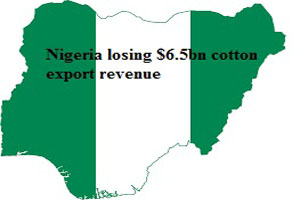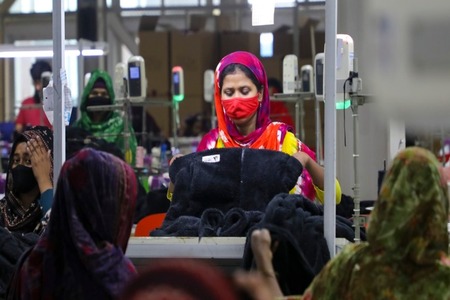
Nigeria losing $6.5bn cotton export revenue
YarnsandFibers News Bureau 2017-01-02 10:00:00 – AfricaNigeria is missing out among the selected 15 African countries on the share of cotton in product exports by the World Cotton Market on cottonguide.org, as cotton farming in Nigeria due to lack of improved seeds, access to extension services and low prices of the produce have been facing major setback over the years. As a result, Nigeria is said to be losing about $6.5 billion export opportunities in cotton annually. It’s contribution to GDP dropping from 25 percent to 4 percent.
It has also been revealed that the country spends $4 billion annually importing textiles and readymade clothing, which could have gone into the pocket of Nigerian farmers if the industry is revived.
Cotton farmers, especially in Northern Nigeria, have been lamenting over recording low yield and returns despite working hard and investing so much in the production of cotton. This development forced many farmers to divert attention to the cultivation of other crops like maize, sorghum, soybean and cassava.
Today, cotton which is essentially produced for its fibre, which is universally used as a textile raw material served as an important commodity in the world economy and is being used more than any other fibre.
Considering the arable fertile land Nigeria possesses, with the important use of cotton across the country and the world, coupled with states like Kaduna, Kastina, Zamfara, Sokoto, Ondo, Ogun, Oyo, Osun and others where cotton grows, farmers say Nigeria can achieve 60 to 70 percent of what America is getting today .
If government at various levels could provide improved seeds, fertilizer, modern equipment like tractors for clearing of land and give right supports. In order to revive the cotton industry, stakeholders said that Nigerian authorities must adopt biotechnology cotton, which they say has a high potential for added value.
The industry will continue to witness tremendous decline in production of high yielding, pest and disease-resistant variety such as the biotechnology cotton failed to be fully adopted by the Federal Government, according to stakeholders.
Government need to now graciously revisit those schemes and ensure that there is cotton corporation just like the board as a guide because there is no way farmers can produce cotton without government intervention.
A cotton farmer from Zamfara, Dinladi Hassan Dinladi, said that farmers are no longer cultivating cotton because of low yields, lack of competitive price and market, and no improved seeds to replace the conventional ones. Since the dissolution of the Marketing Board, there has been no particular cotton market in Zamfara where farmers can take their cotton to be graded to determine the levels of the quality.
Before the dissolution of Marketing Board, cotton used to be graded and rated A, B, C and D according to its quality. This is because any contaminated cotton will be rejected right at the spot. These are done for farmers to get value for their produce.
The government is urged to provide special intervention funds for cotton farmers, which would enable them to be committed to cotton farming and production.
The abandoning of cotton resulted to textile industry in Nigeria going moribund. If cotton industry is revived, the textile industry will come alive and if the textile industry is revived, cotton production will be on the rise. The two industries need each other. So government must do something about it as a matter of urgency.
The African countries that share of cotton in product exports by the World Cotton Market on cottonguide.org, are Burkina Faso ranked number one along with Benin with exports of 71.5 percent and 63.2 percent while Mali, Zimbabwe and Togo possessed exports of 35.6 percent, 12.4 percent and 11.7 percent respectively.
However, United Republic of Tanzania and Uganda recorded exports of 6.4 percent and 5.7 per cent respectively while Cameroon and Zambia also accounted for exports of 5.6 percent and 5.4 percent respectively. Meanwhile, Malawi, Sudan and Cote d’lvoire have exports of 3.8 percent, 2.5 per cent and 2.2 percent while Burundi, Ghana and Central African Republic possessed exports of 1.8 percent, 0.8 percent and 0.7 percent respectively.
Market Intelligence
Ask for free sample Report

experience
Customer Base
dedicated team
Countries Served Worldwide









